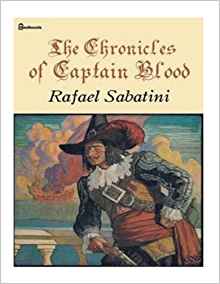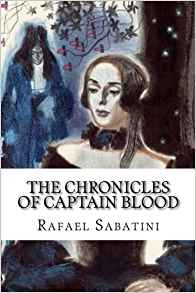-
The Chronicles of Captain Blood
Rafael Sabatini, Michael Maloney, Audible Studios
Audiobook (Audible Studios, Feb. 4, 2013)Further adventures from the much-loved Captain Blood, the 'Robin Hood' of the Spanish Seas. In his latest exploits, The Chronicles of Captain Blood takes Peter to new adventures with as much excitement and swashbuckling adventure as ever before. Winning invaluable treasures, rescuing his crew from almost certain death and saving an English settlement are all in a day's work for this remarkable hero of land and sea.
-
The Chronicles of Captain Blood
Rafael Sabatini
Paperback (Independently published, April 1, 2019)Further adventures from the much-loved Captain Blood, the 'Robin Hood' of the Spanish Seas. In his latest exploits, 'The Chronicles of Captain Blood' takes him to new adventures with as much excitement and swashbuckling adventure as ever before.
-
The Chronicles Of Captain Blood
Raphael Sabatini
language (, Dec. 3, 2012)Further adventures from the much-loved Captain Blood, the 'Robin Hood' of the Spanish Seas. In his latest exploits, The Chronicles of Captain Blood takes him to new adventures with as much excitement and swashbuckling adventure as ever before. Winning invaluable treasures, rescuing his crew from almost certain death and saving an English settlement are all in a day's work for this remarkable hero of land and sea.
-
The Chronicles of Captain Blood
Rafael Sabatini
Paperback (CreateSpace Independent Publishing Platform, Feb. 20, 2018)None
-
The Chronicles of Captain Blood
Raphael Sabatini
eBook (Vintage Digital, Feb. 29, 2012)One-time doctor and fugitive from the Monmouth rebellion, Peter Blood escaped from slavery to become the terror of the Caribbean. Winning invaluable treasures, rescuing his crew from almost certain death and saving an English settlement are all in a day's work for fiction's boldest adventurer.
-
Chronicles of Captain Blood
Rafael Sabatini
language (, May 30, 2017)Further adventures from the much-loved Captain Blood, the 'Robin Hood' of the Spanish Seas. In his latest exploits, The Chronicles of Captain Blood takes him to new adventures with as much excitement and swashbuckling adventure as ever before. Winning invaluable treasures, rescuing his crew from almost certain death and saving an English settlement are all in a day's work for this remarkable hero of land and sea.
-
The Chronicles Of Captain Blood
Raphael Sabatini
Paperback (House of Stratus, Jan. 11, 2008)Further adventures from the much-loved Captain Blood, the ‘Robin Hood’ of the Spanish Seas. In his latest exploits, 'The Chronicles of Captain Blood' takes him to new adventures with as much excitement and swashbuckling adventure as ever before. Winning invaluable treasures, rescuing his crew from almost certain death and saving an English settlement are all in a day’s work for this remarkable hero of land and sea.
-
The Chronicles of Captain Blood
Rafael Sabatini
Paperback (CreateSpace Independent Publishing Platform, Dec. 7, 2016)No Description Available Rafael Sabatini was born in Jesi, Italy to an English mother and Italian father. His parents were opera singers who became teachers. At a young age, Rafael was exposed to many languages, living with his grandfather in England, attending school in Portugal and, as a teenager, in Switzerland. By the time he was seventeen, when he returned to England to live permanently, he was the master of five languages. He quickly added a sixth language — English — to his linguistic collection. He consciously chose to write in his adopted language, because, he said, "all the best stories are written in English." After a brief stint in the business world, Sabatini went to work as a writer. He wrote short stories in the 1890s, and his first novel came out in 1902. It took Sabatini roughly a quarter of a century of hard work before he attained success with Scaramouche in 1921. This brilliant novel of the French Revolution became an international best-seller. It was followed by the equally successful Captain Blood in 1922. All of his earlier books were rushed into reprints, the most popular of which was The Sea Hawk from 1915. Sabatini was a prolific writer; he produced a new book approximately every year. While he perhaps didn't achieve the mammoth success of Scaramouche and Captain Blood, nonetheless Sabatini still maintained a great deal of popularity with the reading public through the decades that followed. The public knew that in picking up a Sabatini book, they could always count upon a good read, and his following was loyal and extensive. By the 1940s, illness forced the writer to slow his prolific method of composition. However, he did write several additional works even during that time. He died February 13, 1950 in Switzerland. He is buried at Adelboden, Switzerland. On his head stone his wife had written, "He was born with a gift of laughter and a sense that the world was mad," the first line of his best-known work, Scaramouche.
-
The Chronicles of Captain Blood
Rafael Sabatini
Hardcover (Benediction Classics, April 30, 2011)First published in 1931, this new edition is now available. It is a collection of short stories set within the timeframe of Sabatini's best-selling novel 'Captain Blood'. A second collection of short stories 'The Fortunes of Captain Blood (1936) is also available.
-
The Chronicles Of Captain Blood
Raphael Sabatini
Paperback (House Of Stratus, June 30, 2001)Further adventures from the much-loved Captain Blood, the ‘Robin Hood' of the Spanish Seas. In his latest exploits, 'The Chronicles of Captain Blood' takes him to new adventures with as much excitement and swashbuckling adventure as ever before. Winning invaluable treasures, rescuing his crew from almost certain death and saving an English settlement are all in a day's work for this remarkable hero of land and sea.
-
The Chronicles Of Captain Blood
Rafael Sabatini
Paperback (Pan Books, July 6, 1963)None
-
Chronicles of Captain Blood
Rafael Sabatini
Paperback (Vintage Classic, June 1, 2011)One-time doctor and fugitive from the Monmouth rebellion, Peter Blood escaped from slavery to become the terror of the Caribbean. Winning invaluable treasures, rescuing his crew from almost certain death and saving an English settlement are all in a day's work for fiction's boldest adventurer.